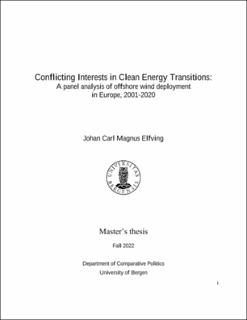Conflicting Interests in Clean Energy Transitions: A panel analysis of offshore wind deployment in Europe, 2001-2020
Master thesis

Åpne
Permanent lenke
https://hdl.handle.net/11250/3051744Utgivelsesdato
2022-12-06Metadata
Vis full innførselSamlinger
- Master theses [110]
Sammendrag
Offshore wind has become an increasingly attractive energy source in the ongoing transition from fossil fuels to renewable energy sources. Until recently, this clean energy technology has primarily been deployed in a handful of countries in Europe. And while the European offshore wind sector is widely regarded as one of the most successful developments of the renewable energy sector, a more detailed examination reveals a parallel story of failure that has not been given equal attention. Although a number of EU member states formulated offshore wind ambitions for 2020, most countries were not only unsuccessful in meeting their respective targets but failed to oversee any deployment at all. What explains this clear-cut separation between frontrunners and laggards? The main theoretical argument put forward is that this divergence can be explained by the strength and influence of organized domestic interest groups – i.e., the winners and losers of clean energy transitions – that actively support or oppose offshore wind deployment. Emphasizing the importance of business interests, a large renewable advocacy coalition is hypothesized to be positively associated with offshore wind deployment. Conversely, a large fishing sector and energy-intensive industry are hypothesized to be negatively associated with offshore wind deployment. While previous studies have been temporally and spatially restricted, this thesis executes the first-ever time-series cross-sectional regression analysis of offshore wind deployment. The novel dataset covers 20 countries for a period of 20 years. Given the limited nature of the dependent variable, measured as the share of offshore wind in total electricity capacity, I implement Tobit regression models. The results from this analysis provide mixed support for the outlined theoretical expectations: Whereas a large renewable advocacy coalition is strongly associated with offshore wind deployment, no significant discernable effect is found regarding the fishing sector and energy-intensive industries.
Beskrivelse
Postponed access: the file will be accessible after 2025-03-01